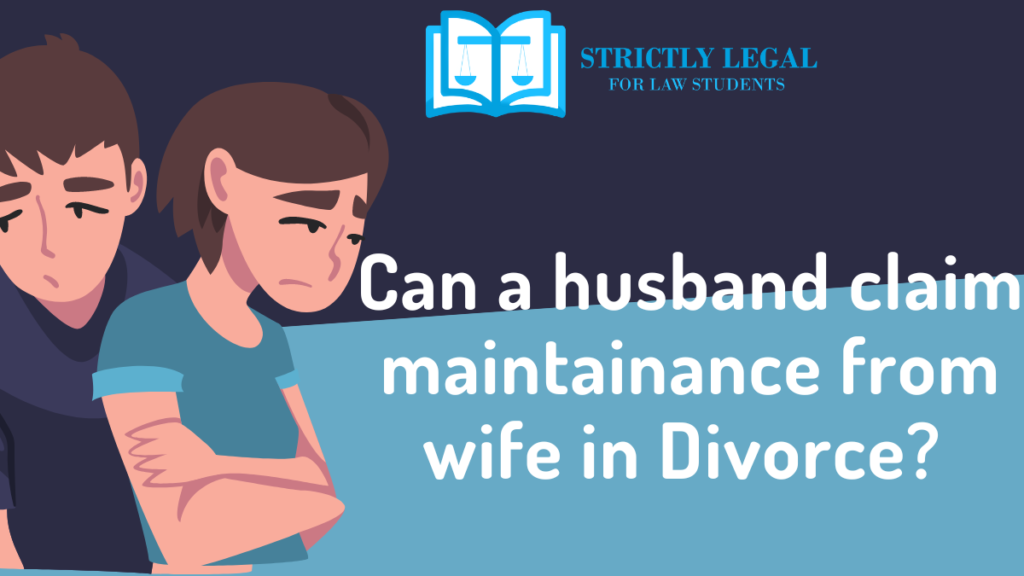The notion of maintenance being claimed by the wife after/ in divorce is very common and well accepted, however it is still not known to the societies of India regarding the rights of maintenance by the husband. The Justice System that India follows is very equitable in nature, that treats both men and women equally irrespective of their gender and sex and so, equal rights is given to both the parties to divorce i.e., to the husband and the wife pertaining to prior conditions before the grant of decree.
Table of Contents
Understanding the term “Maintenance”
The very term “Maintenance” itself legally means certain incentives that can lead to fulfilling of necessities (food, shelter, cloth, education, medical expenditure etc.) Precisely, it is a monetary assistance or support given by the wife or the husband after the required decree is passed that covers all the basic necessities of the partner who is claiming for maintenance. There is a very lame and fluent idea to provide the notion of maintenance in the personal laws, and that, very simply means, to provide financial support to the partner who is a little less capable (or incapable) may it be financially or virtually.
Persons eligible to claim Maintenance
As per Section 125 of the Code of Criminal Procedure, 1973, the following persons may be eligible to claim maintenance. They are as follows:
- A wife from her husband.
- Minor children (legitimate or illegitimate) from their father.
- Dependent father or mother. (who are unable to maintain themselves)
- Minor female child until she attends the age of maturity.
Provisions for husband claiming maintenance from wife
As stated earlier, the notion of husbands seeking for maintenance from their wives is still not so popular and known to many people, and so, there is always a chitter chatter when such an issue occurs. However, the Hindu Marriage Act, 1955 has a provision that is Section 24 that provides for maintenance of two types: Maintenance of Pendente Lite and the expenses of the proceeding to the husband. Last but not the least, Section 25 of the Hindu Marriage Act, 1955 also accords the husband with another essential right to get permanent alimony and maintenance. In both these sections the notion “Maintenance” covers the ambit of various things, such as food, shelter, clothes, education, medical expenses and many more that are required to sustain in someone’s life.
Under Section 24 of the Hindu Marriage Act, 1955, it is so quoted that, “In any proceeding under this Act it appears to the court that either the wife or the husband, as the case may be, has no independent income sufficient for her or his support and the necessary expenses of the proceeding, it may, on the application of the wife or the husband, order the respondent to pay to the petitioner the expenses of the proceeding, and monthly during the proceeding such sum as, having regard to the petitioner’s own income and the income of the respondent, it may seem to the court to be reasonable.”
S. 24, The Hindu Marriage Act, 1955 (Act No. 25 of 1955)
The above quoted provision section precisely means that, a “deserving party” , may it be the husband or the wife, who does not earn or have a steady and competent income that can be termed as ample for his or her living as well as does not have the necessary expenses to carry out with the court’s proceedings can claim maintenance from their wife or husband (as the case may be) if the other party is capable of performing the same. Now, the section does not explicitly terms the “husband” to claim maintenance but has cleverly mentioned that whosoever is incapable and is unable to meet the expenses of the court’s proceedings even can claim maintenance irrespective of being a wife or the husband.
Now, section 25 of the Hindu Marriage Act, 1955 is more or less the same like the aforementioned section. It throws light on permanent alimony and maintenance impels the husband or the wife (as the case may be) to pay a gross sum income (one time) or by paying monthly or periodical sum of the husband’s or wife’s lifetime, with respect to the nature of the paying party’s income and property.
Precedents that has accorded maintenance to Husbands
In one of the landmark judgements delivered by the Hon’ble High Court of Bombay in Kanchan v. Kamalendra AIR 1993 BOM 493, the Honorable Apex Court made a noteworthy observation that the purview of Section 24 of the Hindu Marriage Act, 1955 not only covers wife but also the husband to “seek maintenance pendente lite if he can exhibit that he has no independent source of income.” Here, the most essential task for the husband is to evidently showcase his exhibits so made that he is unable, incapable and has no actual and independent source of income to earn and support his family due to any physical or mental disability. However, it was also mentioned by the Hon’ble Apex Court that if the husband is completely fit and fine physically and not mentally ill, and just because his business or area of work has failed, he could not be accorded maintenance from his wife on such grounds, as it would be violative of the essence of Section 24, Hindu Marriage Act, 1955.
In another Judgement delivered by the Hon’ble High Court of Kerala, in Nivya V M v. Shivaprasad M K, 2017 (2) KLT 803, the hon’ble court again made notable observations that according the plea of maintenance to the husbands only when they are incapable to work in the name of business failure or so would lead to “idleness”. However, if it is exhibited that, the husband is permanently disabled whether physically or mentally to work and learn, hey may claim the remedy of maintenance.
There is no hard and fast rule to decide upon an amount that is to be paid in the form of maintenance in every case uniformly, rather, it is duly upon the discretion of the Hon’ble Court of Law to formulate the amount of maintenance that is to be paid to the party claiming it. However, the following are some of the factors that may decide the quantum of maintenance:
- The Status of parties: Here the status of the parties solely refers to financial and social status. In such a case, the court of law evaluates the status of both the parties and fixes an amount to be given as maintenance.
- The feasibility of claims and needs of the spouse: The claims of the husband or the wife must be feasible enough to be true and just and shall match the basic necessities of their lives. As well as, if the demands of the demanding spouses are not feasible and just then the Court may dismiss such claims.
- Earning capacity of the husband or the wife: In the process of deciding the amount of maintenance to the husband or the wife, the court shall consider the spouse’s earning capacity who is to give the maintenance.
Conclusion
It is only normal for husbands to claim for maintenance from their wives keeping aside the “already-set” gender specific roles set by the society. Rather, as set clear by the Indian Judiciary, a man can only be accorded maintenance from his wife when he is left with no other option. Mere failure in setting/ forming a business is not a ground for the husband to claim for maintenance from his wife.

Law student.
Turning legal insights into engaging narratives.




